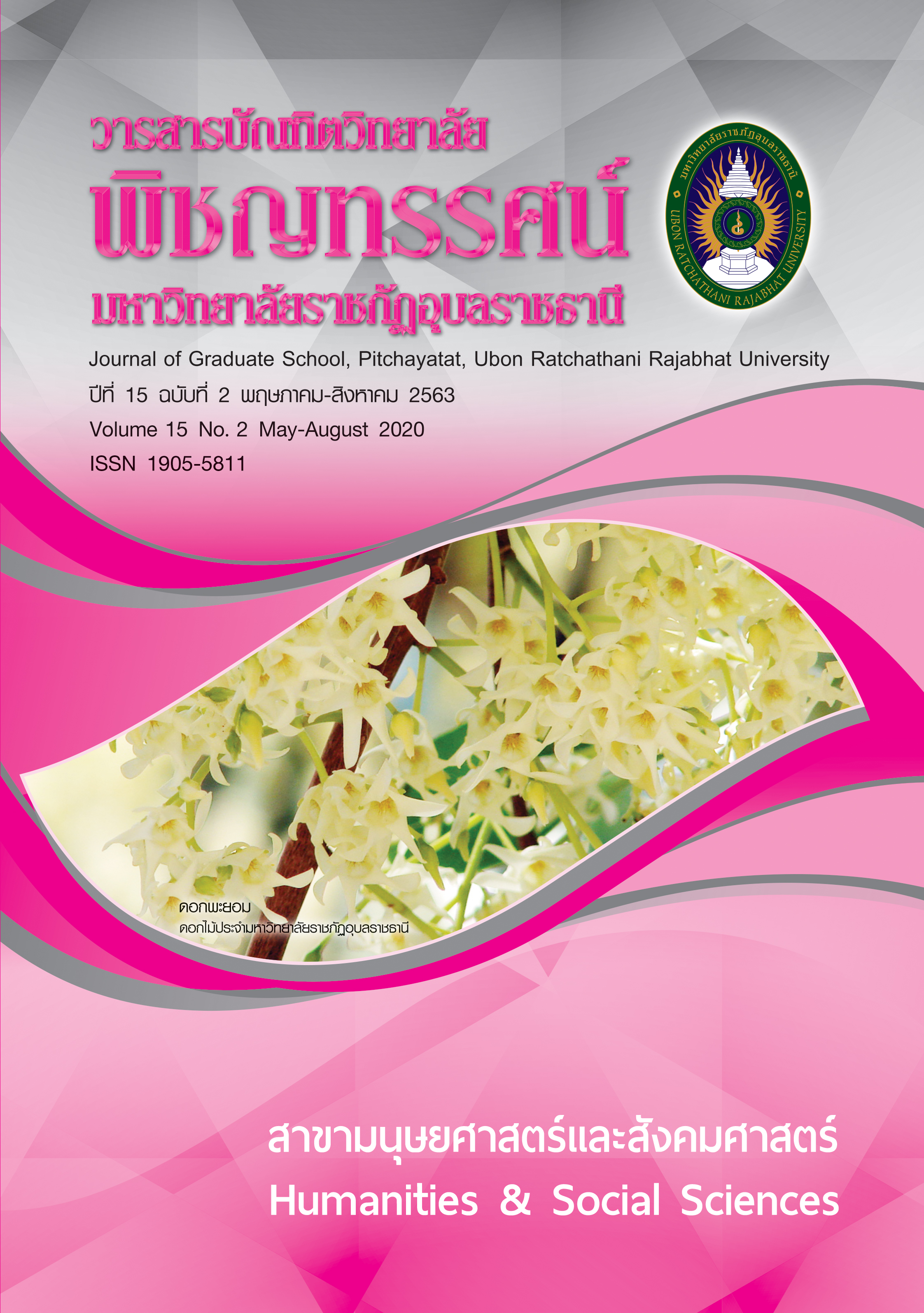อิทธิพลการจัดการสีเขียวที่มีต่อคุณค่าตราสินค้าและผลการดำเนินงาน ทางการตลาดของอุตสาหกรรมสีเขียวในประเทศไทย
คำสำคัญ:
การจัดการสีเขียว, คุณค่าตราสินค้า, ผลการดำเนินงานทางการตลาด, อุตสาหกรรมสีเขียวบทคัดย่อ
บทคัดย่อ
การวิจัยนี้มีวัตถุประสงค์เพื่อ ทดสอบอิทธิผลการจัดการสีเขียวที่มีต่อคุณค่าตราสินค้าและผลการดำเนินงานทางการตลาดของอุตสาหกรรมสีเขียวในประเทศไทย โดยการเก็บรวบรวมข้อมูลจากผู้บริหารอุตสาหกรรมสีเขียวในประเทศไทยจำนวน 268 คน และใช้แบบสอบถามเป็นเครื่องมือ สถิติที่ใช้ได้แก่ ค่าเฉลี่ย ส่วนเบี่ยงเบนมาตรฐาน และการสร้างโมเดลสมการโครงสร้าง
ผลการวิจัยพบว่า
โมเดลปรับปรุงของสมการโครงสร้างอิทธิผลการจัดการสีเขียวที่มีต่อคุณค่าตราสินค้าและผลการดำเนินงานทางการตลาดของอุตสาหกรรมสีเขียวในประเทศไทย มีค่า χ2 = 80.619, df = 77, χ2 /df = 1.047, p-value = .367, GFI = .962, CFI = .998, NFI = .959, RMR = .171 และ RMSEA = .013 ผลที่ได้รับผ่านเกณฑ์ทุกข้อ และมีความสอดคล้องกับข้อมูลเชิงประจักษ์
คำสำคัญ: การจัดการสีเขียว คุณค่าตราสินค้า ผลการดำเนินงานทางการตลาด อุตสาหกรรมสีเขียว
เอกสารอ้างอิง
Carroll, A. B. Ethical challenges for business in the new millennium: corporate social responsibility and models of management morality. Bus. ethics Q. 101 (2000): 33-42.
Clark, B. H. “Marketing Performance Measures: History and Interrelationships,” Journal of Marketing Management. 15, 8 (1999): 711-732.
Claver, E., et al. “Environmental management and firm performance: a case study,” J. Environ. Manage. 84 (2007): 606-619.
Cobb-Walgren, C. J., Ruble, C.A., and Donthu, N. “Brand equity, brand preference, and purchase intent,” J. Advert. 24, 3 (1995), 25-40.
Gast, J., Gundolf, K. and Cesinger, B. “Doing business in a green way: a systematic review of the ecological sustainability entrepreneurship literature and future research directions,” J. Clean. Prod. 147 (2017): 44-56.
Gomez, M., Lopez, C., and Molina, A. “A model of tourism destination brand equity: The case of wine tourism destinations in Spain,” Tourism Management. 51 (2015): 210-222.
Hade, S. S. P., Oyler, J. D., and Humphreys, J. H. “Historical, practical, and theoretical perspectives on green management: an exploratory analysis,” Manag. Decis. 47, 7 (2009): 1041-1055.
Hair, J. F. et al. Multivariate Data Analysis. 7th ed. Upper Saddle River, New Jersey: Prentice-Hall, 2010.
Johns, R. Likert items and scales. SQB Methods Fact Sheet 1. University of Strathclyde, 2010.
Keller, K. L. “Conceptualizing, measuring, and managing customer-based brand equity,” Journal of Marketing. 57, 1 (1993): 1-22.
Kilbourne, W., and Pickett, G. “How materialism affects environmental beliefs concern, and environmentally responsible behavior,” J. Bus. Res. 61, 9 (2008): 885-893.
Kline, B. R. Principles and Practice of Structural Equation Modeling. 4th ed. New York: The Guilford Press, 2015.
McWilliams, A., and Siegel, D. “Corporate social responsibility and financial performance: correlation or misspecification?,” Strategic Manage. J., 21 (2000): 603-609.
Miller, G. A. The magical number seven, plus or minus two: some limits on our capacity for processing information. Psychological Review. 63, 2 (1956): 81-97.
Mitrega, M., et al. “Networking capability in business relationships Concept and scale development,” Industrial Marketing Management. 41, 5 (2012): 739-751.
Murillo-Luna, J. L., Garcés-Ayerbe, C., and Rivera-Torres, P. “Why do patterns of environmental response differ?. A stakeholders pressure approach,” Strategic Management Journal. 29, 11 (2008): 1225-1240.
Nam, J., Ekinci, Y., and Whyatt, G. “Brand equity, brand loyalty and consumer satisfaction,” Annals of Tourism Research. 38, 3 (2011): 1009-1030.
Namkung, Y., and Jang, S. “Effects of restaurant green practices on brand equity formation: Do green practices really matter?,” International Journal of Hospitality Management. 33 (2013): 85-95.
Pal, P., and Dey, P. “Process intensification in lactic acid production by three stage membrane integrated hybrid reactor system,” Chem. Eng. Process. Process Intensif. 64, 2 (2013): 1-9.
Richey R. G. Jr., et al. “The effects of environmental focus and program timing on green marketing performance and the moderating role of resource commitment,” Industrial Marketing Management. 43 (2014): 1246-1257.
Schniederjan, M.J., et al. “Comparative analysis of Malcolm Baldrige national quality award criteria: an empirical study of India, Mexico, and United States,” Qual. Manag. J. 13, 4 (2006): 7-21.
Swoboda, B., Weindel, J., and Halsig, F. “Predictors and effects of retail brand equity-a cross-sectoral analysis,” J. Retail. Consum. Serv. 31 (2016): 265-276.
Verhoef, P. C., Langerak, F., and Donkers, B. “Understanding brand and dealer retention in the new car market: The moderating role of brand tier,” Journal of Retailing. 83, 1 (2007): 97-113.
Wong, T., and Wickham, M. An “examination of Marriott's entry into the Chinese hospitality industry: A Brand Equity perspective,” Tourism Management. 48 (2015): 439-454.
Wu Y. N., Yan, H. Y., and Huang, Z. J. “Elementary Introduction to the Green Management of the Construction in Whole Process,” Physics Procedia. 24 (2012): 1081-1085.
Yam, R. C. M., et al. “An audit of technological innovation capabilities in Chinese firms: some empirical findings in Beijing, China,” Res. Policy. 33, 8 (2004): 1123-1140.
Yoo, B., Donthu, N., and Lee, S. “An examination of selected marketing mix elements and brand equity,” Academy of Marketing Science. 28, 2 (2000): 195-211.
Zhang, B., et al. “Why do firms engage in environmental management? An empirical study in China,” J. Clean. Prod. 16 (2008): 1036-1045.
ดาวน์โหลด
เผยแพร่แล้ว
รูปแบบการอ้างอิง
ฉบับ
ประเภทบทความ
สัญญาอนุญาต
บทความทุกเรื่องได้รับการตรวจความถูกต้องทางวิชาการโดยผู้ทรงคุณวุฒิภายนอกอย่างน้อย 3 คน ความคิดเห็นในวารสารพิชญทรรศน์เป็นความคิดเห็นของผู้นิพนธ์มิใช่ความคิดเห็นของผู้จัดทำ จึงมิใช่ความรับผิดชอบของวารสารพิชญทรรศน์ และบทความในวารสารพิชญทรรศน์สงวนสิทธิ์ตามกฎหมายไทย การจะนำไปเผยแพร่ต้องได้รับอนุญาตเป็นลายลักษณ์อักษรจากกองบรรณาธิการ





